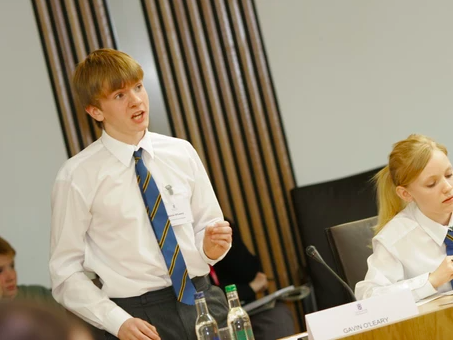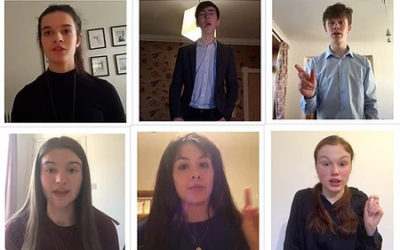Welcome to the first of our monthly posts on debating tips and techniques.
Our first post looks at DELIVERING A GREAT SPEECH FROM OPENING PROPOSITION.
So you’ve been assigned your place on the table, and you’re in First Proposition. Some debaters will think, ‘why me?’ – after all, you’re the first up to speak, you’ve got the tough job of defining the motion, and you don’t get as much rebuttal time. But actually, this is a great position to be in if you follow a few simple rules. Here are a few tips and tricks to help you deliver a great speech from First Proposition.To demonstrate these techniques, let’s suppose you’ve been given the motion ‘This House would ban school uniform’.
Your first role is to set up the debate, explain the motion, and make it clear to everyone what the debate is about. If this isn’t done, the debate can get ‘messy’, making it confusing to listen to and make it difficult for your audience to agree with you.Your second role, in a ‘This House Would’ debate, is to put forward a policy or mechanism to solve the problem. You need to tell us the benefits of your solution, and how it’s going to be better than the status quo. Basically, you need to persuade the judges that not only is there something that needs to be fixed urgently, but that your idea is the best way of fixing it.
Defining the Motion: The Basics
Opening proposition needs to do 3 things:
1. Define the Motion.
Are there terms in the motion that need explaining? For example, what’s meant by ‘This House’? Who are you talking about? Are you banning uniform just at your school, or should this be something implemented by the Scottish Government?
2. Describe the Problem.
What are you trying to fix? Why is it a problem? Who is it a problem for? Why should we fix it ?
3. Tell Us How to Fix the Problem.
How is it going to work? Who is going to do it?
When you’re defining the motion, you should be asking yourself 3 questions: Why? Why this? Why now?
You need to consider:
1. Which arguments are the most important?
2. Why does the action have to be taken now?
3. How will the proposed solution change things?
4. Will this affect anyone outside the problem (will it affect someone else, other than school pupils)?
5. Are there any analogous situations (is there any other policy/situation that you can compare this to?)
Remember: the best way to improve your debating skills is getting lots of practice, so don’t worry if this seems a lot to take in. You’ll get there! Now let’s move on to some more advanced dos and don’ts…
Advanced Dos & Don’ts
1. Don’t be tempted to trick the Opposition.
It’s tempting to define the motion in a really obscure or complicated way that makes it hard for the Opposition to come back at you. However, judges don’t like this very much. You want to set up the debate so that everyone has a chance to argue properly. When you go against the ‘spirit’ of the motion, this is known as ‘squirrelling’ and is frowned upon by judges.
An example might be defining the motion ‘This House Would go green’ by saying that this House, as the UK, would give the ‘green light’ to Scottish independence. Obviously, most people will have gone into this debate thinking that it will be about environmental issues, not Scottish independence! You’ll be tricking the Opposition and leaving them with very little to say. This is unfair to the other teams.
2. Don’t ‘hang your case’.
‘Hanging your case’ means to hide your definition in the second speaker’s speech. People do this when they have a weak definition, or are trying to trick the opposition.
Get your definition out of the way in the first speaker’s speech. This won’t just make it easier for everyone; it’ll also make your case look stronger.
3. Do build in caveats.
It’s a good idea to think about reasonable exceptions to your definition.
For example, you can say that when you abolish school uniform pupils will be able to wear what they like – with the exception of of t-shirts with offensive slogans, facial jewellery, etc. These are pretty reasonable exceptions to make, since they’re often included in dress codes in the workplace, or for schools that don’t have a uniform.
4. Don’t make a truistic definition.
A truistic definition is when a proposition team state a truth. These definitions can’t be argued against, because the proposal is true.
An example would be if the debate is on the motion ‘This House supports affirmative action’, and the proposition argued that ‘Affirmative Action was intended to combat racial discrimination. Therefore, in supporting affirmative action, the main point we as Proposition have to prove is that racial discrimination is a bad thing’.
This sort of definition leaves the Opposition with very little to argue against. Of course racial discrimination is a bad thing, but that’s not something you have to prove. It’s the truth!
Instead, you need to focus on the policy itself – is this the best way to end racial discrimination?
5. Do define the motion as going against the status quo.
When you’re in First Proposition, you have to propose a solution to the problem identified by the motion. A ‘status quo’ definition means that you’re defending the current situation.
For example, if you’re debating This House Would ban smoking, banning smoking isn’t a good definition since this is already the case in the UK. You’ll need to define it as banning smoking .
Download this as a Word document.




